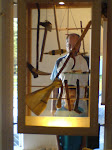Can empathy be taught? Are we born more or less emotionally intelligent or more or less empathic (some are more empathic by nature than others)? Can emotional intelligence be taught? Can one tell children or anyone to be more empathic or to love anyone?
Or from where does empathy (and emotional intelligence) come?
Does it come from our capacity as grown ups to meet the child, even the very small child, even the newborn and even the foetus, with empathy, care, respect?
And if we didn’t get this as small how do we handle this later in life? How do we learn empathy and thus emotional intelligence?
Miller thinks we need to have compassion and empathy for the child we once were to be able to be empathic and compassionate with other people…
I think she is right. If empathy and compassion – and emotional intelligence is learned from outside so to say, it can never be really genuine…
Can children be told to love each others or anyone else? Doesn’t a child love when there are reasons to love (if it hasn’t been disturbed earlier)? Can’t a child be trusted to love when the time and place and circumstances are the right, when there are reasons to love? Is it a lack of trust in the child it is about? Grounded in what? Confidence in oneself as grown up, or a lack of confidence, depending on what?
How do we as grown ups handle or deal with this? Can we decide to feel in other ways? Is insight about these things enough?
Or do we have to deal with this on a deeper level? Even do a hard work? Not only for others (or our children), but also for ourselves and our lives and the quality of or lives?
And that about being learned emotional intelligence and empathy from outside so to say, training it from outside, what message does this forward? As the message a lot of therapy-methods forward!? Telling the person exposed for the training or therapy: there’s something wrong with you. “You have to learn!”
Isn’t defences strengthened rather than the opposite? For instance in this case the defence to blame oneself, what Ingeborg Bosch calls the Primary Defence.
And it is as Bosch writes about Golemans emotionally intelligent person:
“The general profile of Golemans ‘emotionally intelligent’ person fits the PRI idea of someone who is quite defensive, albeit in a socially desirable way. This might therefore lead to social success, while simultaneously sacrificing contact with the True Self and inner autonomy [and I would say that this can’t lead to real genuineness or authenticity, but the false self is maybe even more strengthened instead].”
Another message that is forwarded in these sorts of training and therapies: an inborn evilness that has to be controlled and checked!? Exactly as many of us was treated earliest in life more or less (very few, if any of us, haven’t got something of this, though some have had the luck to get very little of this and those probably sees things clearer, as those do who have been able to process things)!? The message “You are bad! [i.e. not worth loving]”
Noone (or very few) want to explore what and if there is something behind that badness or evilness!?
Instead we resort to training our compassion, empathy and emotional intelligence from outside. But of course, if there are no other options, and a person is desperate… He/she picks every straw he/she can, sad to say, and the more harmed re at risk getting stuck with saviors?
Do man therapists and the like need someone under them? Do they need to “demonstrate” (maybe entirely unconsciously) their superiority and be the one on top, maybe for the first time in their lives? Depending on their story? Which they haven’t go help to process or acknowledge?
And Pia Melody actually means that telling a child how and what to feel, how to react, how to this and that is a violation. Yes, so she says!? And I would say it is a demonstration of lack of trust and confidence in the child and its good will!? Isn’t it? And from where does this distrust in the child comes? An expression of what? And as Miller writes: you can question a child, but you just don’t question other things or persons, which is entirely out of question! You can put blame on a child, but not on other authority figures… You can direct anger at individuals below yourself in power…
What many therapists and the like is empathy deficits? But from where does empathy deficits come? I don't think this is something we are born with though...
During a tutors-education just a few years ago I joined at the Royal College of Music in Stockholm we spoke a lot about empathy...
Yes, it's one thing to talk about it and another to be genuinely empathic!? And i it possible to learn from outside or can we even decide to start being empathic? But with this not said we shouldn't stop caring about questions about empathy and compassion...
We should need to do a probably hard work... And it would be possible to prevent everything lack of empathy and compassion causes in this world... A psychologist said to me:
"Each generation has to conquer its own".
No, I don't think it has to be so!!! The hard work so many of us have to do (or should have to do, but don't do) wouldn't be necessary if we started to speak more openly about these things and make steps to prevent these things: child abuse of all kinds (not only physical or sexual abuse, but also emotional, how "mild" it even is or "harmless" in our adult eyes. And if these things were so harmless and mil, wouldn't it be easier then to admit to those "small" crimes? And if it isn't - why isn't it?). Even sorts we as grown ups view as fairy harmless. I think things like these can cause more pain in a child than we can imagine, and that it is so painful isn't because some children are so extremely sensitive, but because children in general actually are so sensitive.
But I don't advocate that we as adults are allowed to behave badly, egoistically or anything like this, because we were harmed once and now are "entitled" in some strange way to act all those earlier suppressed/repressed things out. Or allowed to take revenge...
How harmed we even are we still have responsibility for our actions, what we say and do...
And I am very critical to a lot of therapy... And help of all kinds... I don't believe one can decide to just go out and change things... Yes, we CAN but then not without a lot of energy in curbing self-destructive traits... We should need to process these things instead, and if we succeeded in that things would change of itself much more?? Is this only illusionary from my part? I let this be an open question...
And if the harm is so severe, why not preventing it the best we can? And understand even more about what is actually harming and destroying and causing problems? And speaking openly about it, man to man... Why aren't we? Where lies the roots to this?
PS. But some concepts are more healthy than others?
PPS. And I should want to add some thoughts about individuals with low IQ, such as children with Downs Syndrome and their spontaneity... Intelligence can be a problem...
And the spontaneity in dogs for instance... Showing feelings...
Things we have curbed? Feeling things from top to toe... And showing it.
A child acting out, being silent or behaving strangely(even being psychotic) hat is that child trying to say? I the right method to start training EQ-training?
If a child hasn't got the right or proper "models" for what genuine care, compassion, love, empathy etc. are can this be taught from outside? Yes, a child can still be saved?? Even very harmed have been (if they haven't been too damaged or injured), with stamina (uthållighet) from empathic pedagogues (and/or other empathic grown ups) Miller has written. And group-therapy has helped severe criminals...
Now I HAVE to do some work here!
Addition in the evening: See eqi.org on Alice Miller. And also earlier blogpost on therapy and pedagogy.






























2 kommentarer:
Hi again,
I agree with you that true emotional intelligence doesn't come through teaching. At the same time, I think it might be possible for training to impart the 'skills' of tact and diplomacy, which is better than nothing.
I have to admit that I didn't read everything on Steve Hein's site yet. I get the impression he is trying to show what emotional intelligence is by giving examples, not by offering a 'training course' for $$$. His Alice Miller page sums up the best of her insights:
http://eqi.org/amiller.htm
Best wishes,
D.R.B.
Thanks again for the tips! :-)
Yes, there was a lot to read!!
I have things to read the whole winter!
In school here it has been a lot about "social training", learning to cooperate etc.
My English isn't sufficient enough to explain this properly it feels!? And definitely not briefly!
But I am not educated as class-teacher... So I don't work so much with many pupils at the same time.
Best wishes!
PS. During my work at the computer I have burnt two CDs with Christmas-music for choir. It seems as I succeeded with burning them! :-)
I wish I could forward music in that form to the blog too. Haven't learned that yet...
Skicka en kommentar